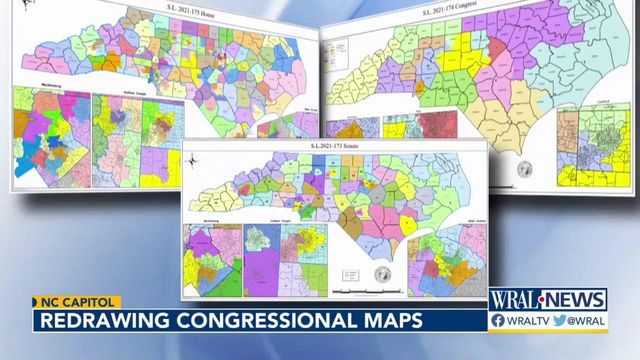Could the US Supreme Court weigh in on NC's redistricting battle?
The U.S. Supreme Court's intervention this week in an Alabama redistricting case could influence whether North Carolina Republicans decide to ask the nation's highest court to intervene in a similar case here.
Posted — UpdatedThe Alabama ruling may have made that option more attractive. But whether and how the high court would intervene in North Carolina’s case is a complex question. There are significant differences between the two cases.
The blocked Alabama ruling was made by a federal three-judge panel, not a state court. And it was based on interpretation of a federal law, Section 2 of the Voting Rights Act, which governs racial considerations in redistricting. The three-judge panel had required lawmakers to draw two majority-minority districts instead of one.
UNC School of Law Professor William Marshall, a Constitutional law expert, told WRAL News state courts usually have primacy over issues of state law, including redistricting.
“Usually, the United States Supreme Court can reverse a state court decision when that decision is interpreting federal law. But in this case, the North Carolina Supreme Court was interpreting state law—that is, the North Carolina state constitution,” Marshall told WRAL News. “So normally, you wouldn't think that the Supreme Court would intervene in such a case.”
That’s even more true given that the U.S. Supreme Court ruled in 2019 that partisan redistricting, at the federal level, is a political matter, not a judicial one. But that same ruling also said state courts could set limits on partisan redistricting under states’ voter protection laws, which tend to be more protective than federal laws.
“What the legislature is going to have to do, if the U.S. Supreme Court is to hear this, is to somehow make a federal constitutional argument that the NC Supreme Court's decision violates the federal constitution,” Marshall said. “And that's a heavy lift.”
“It’s interesting that now some folks think that the U.S. Supreme Court is a more sympathetic body to hear their claims, so they're rushing to the Supreme Court, whereas in previous years, they would have criticized the Supreme Court for taking action here. And the other side's doing the opposite,” Marshall added. “I think that what we're seeing here is an immense politicization of the judiciary, and that is somewhat problematic.”
Lawmakers have already previewed one potential avenue for appeal. In their brief to the state Supreme Court, they argued that the U.S. Constitution, Article 1, Section 4, says that state legislatures, not courts, have the authority to set the time, place and manner of elections.
Michael Bitzer, a Catawba College political science professor, thinks the Alabama ruling may have given them another avenue for appeal: through Section 2 of the Voting Rights Act.
“What we now have is a court that appears willing to say Section 2 is no longer relevant, potentially, to the redistricting dynamic in the states,” Bitzer said.
While the North Carolina case centers on partisan redistricting, Common Cause—a government accountability organization that is a plaintiff in the case—also argued that GOP mapmakers did not do a study of racially polarized voting before beginning to draw the maps, which they argued is a requirement set by an earlier redistricting case. The group also argued that the resulting maps violate the rights of minority voters protected under the VRA.
In its order, the state Supreme Court directed lawmakers to “assess whether, using current election and population data, racially polarized voting is legally sufficient in any area of the state such that Section 2 of the Voting Rights Act requires the drawing of a district to avoid diluting the voting strength of African-American voters.”
Bitzer said he’ll be watching how lawmakers respond to the order.
On Tuesday, the three-judge Superior Court panel that initially heard the North Carolina case issued an order laying out logistics for the redraw. Among the specifics: Judges will bring in an expert to review maps submitted by the North Carolina General Assembly, and to draw their own maps in case the legislature's maps don't comport with the state Supreme Court's ruling.
At least for now, Republican legislative leaders don’t seem overly optimistic that the U.S. Supreme Court will step in, although House Speaker Tim Moore said Monday they’re still considering filing an appeal.
“We haven’t ruled that out at this point; we're pursuing all those options,” Moore, R-Cleveland, told reporters. “But given the very tight timeframe, I think it's very important that we move forward and start working on some maps.”
Allison Riggs, an attorney representing Common Cause in the North Carolina redistricting case, on Wednesday said Moore has a weak case and would have a hard time getting state House and Senate maps considered by the U.S. Supreme Court.
"What Speaker Moore believes to be a good case or presents to be the truth is suspect," Riggs said.
She added, "I don't think they would have any federal grounds for appealing a state legislative map."
Related Topics
• Credits
Copyright 2024 by Capitol Broadcasting Company. All rights reserved. This material may not be published, broadcast, rewritten or redistributed.





